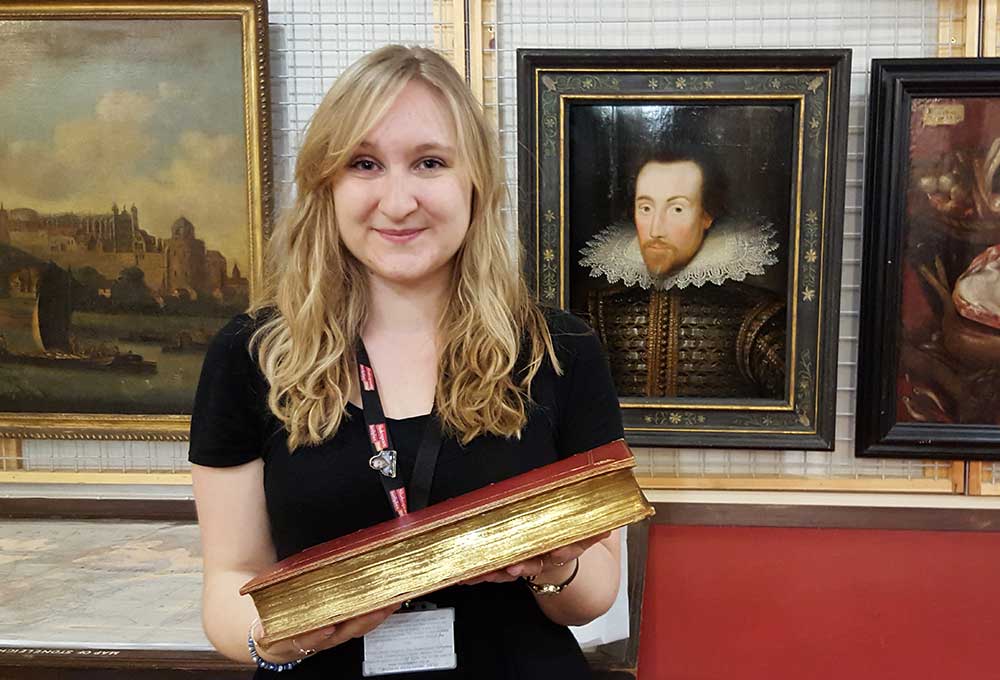For the last eight months I have been working at the Shakespeare Birthplace Trust, as part of The National Archives’ Transforming Archives programme. This has been a wonderful opportunity to learn about the traditional skills of Latin and palaeography within a fascinating and varied archive.

Bethany Elliott with first folio
Before starting the traineeship I studied Archaeology and Ancient History at university, where I had already gained some experience of learning Latin. It was something which I enjoyed and really wanted to learn more about. I had also completed a Master’s degree in Forensic Investigation and particularly enjoyed learning about ‘Fakes and Forgeries’. I had been given a chance to look at a more scientific side to art and heritage and a better understanding of the need to preserve our history. Although I had not considered a future in archives, I knew I wanted to work in a heritage environment and that I was particularly interested in making history accessible to a range of audiences, so when I noticed this traineeship advertised it seemed to be exactly what I was looking for.
I am now two thirds of the way through my traineeship and can happily say that I have thoroughly enjoyed every second of it!
I have learnt so much already working in the archives of my host organisation, the Shakespeare Birthplace Trust (SBT), which contains some fascinating archive items, such as the ‘Composite Register of Baptisms, Marriages and Burials’ which includes entries relating to Shakespeare and his decedents.
The Trust formed in 1847, following the purchase of Shakespeare’s Birthplace as a national memorial. They now care for an additional four houses relating to the life of William Shakespeare: New Place, Hall’s Croft, Mary Arden’s Farm and Anne Hathaway’s Cottage. In addition to this the Trust holds around 55,000 books and over one million documents relating to the history of Stratford-Upon-Avon and South Warwickshire, including the world’s largest collection of Shakespeare related material accessible to the public. The archive’s ‘Local History’ collection contains documents dating as far back as the 12th century, as well as copies of the Stratford Herald dating back to 1861. It also looks after the Royal Shakespeare Company (RSC) Archive, containing photographs, programmes and production records from 1879 to present, as well as the Bram Stoker Collection.
Throughout the traineeship, I have had access to this incredible archive and the chance to work on some brilliant projects. After having undertaken formal learning in Latin and palaeography, one of my tasks was to transcribe and translate a bond between John and Mary Shakespeare (William’s parents) and a yeoman named Robert Webbe for one of the SBT’s exhibitions. It’s a wonderful feeling to be able to read a document like that, not only in the ability to read the Latin and Medieval handwriting, but it also occurs to you that you are reading a document signed by two people who were to become a significant part of our history.
In addition to transcriptions, I have also worked regularly in the reading room answering reader enquiries. I have also spent some time cataloguing deeds, working with court of records and I have worked on preparing documents to go into the Trust’s exhibitions, ‘Famous Beyond Words’ and ‘Treasures’. I also helped during ‘Take-Over Day’ at SBT, a memorable experience of watching primary school children ‘take over’ parts of our jobs, in my case learning ‘Tudor Handwriting’ and document cleaning. This was a lovely chance to work in audience engagement and start trying to get people interested in archives from a young age.
Throughout the traineeship, I also spent some time transcribing receipts in the Borough Records, something which really gave me an idea of everyday life in the 18th and 19th centuries. It’s fascinating to see certain items appear repeatedly and even more interesting when something new comes up, it makes you wonder what it was needed for! As well as working in this archive, I have also had the chance to visit many others during my traineeship; including The National Archives, General Register House in Edinburgh and a two week placement at Warwick County Record Office, which were all brilliant opportunities to see how different archives operate. The traineeship also offers many chances for additional training, and I am very much looking forward to taking part in a palaeography summer school in the coming months.
I have really enjoyed my traineeship so far and having been accepted onto an MA in Archive Administration, I hope to continue to work in archives in the future. I am really grateful for this opportunity and have had some wonderful experiences working at the Shakespeare Birthplace Trust. I will continue to make the most of my time here before it’s time for the new trainee to start in October!
Find out how to apply to join the Transforming Archives programme.

Hello!
Do you have any record of the female aviator Amy Johnson, selling short
flights with her from somewhere in Stratford?
Many thanks
Hi Susan,
Thank you for your comment.
We’re unable to help with research requests on the blog, but if you go to our contact us page: http://nationalarchives.gov.uk/contact/ you’ll see how to get in touch with our record experts via phone, email or live chat.
I hope that helps.
Nell